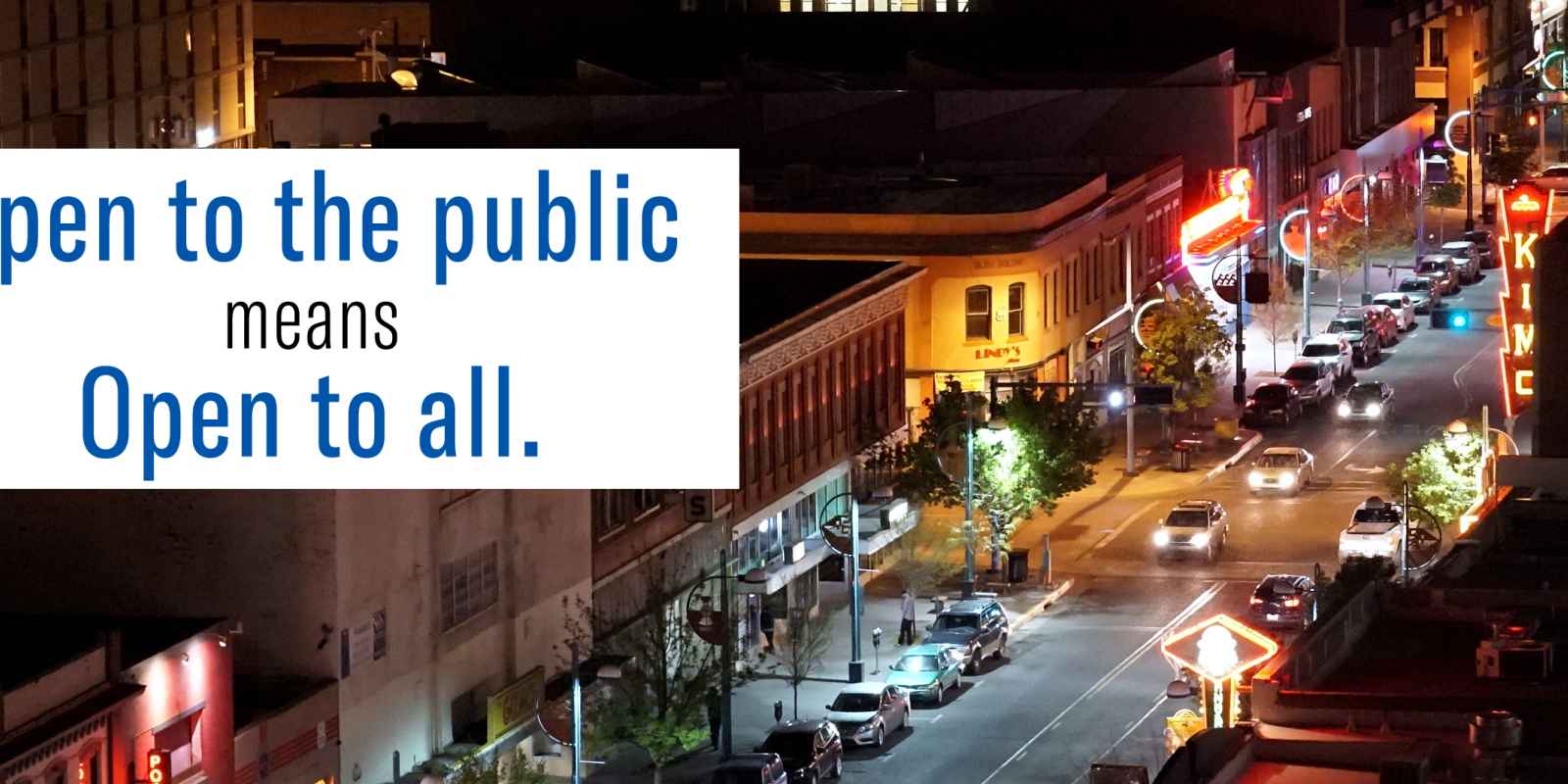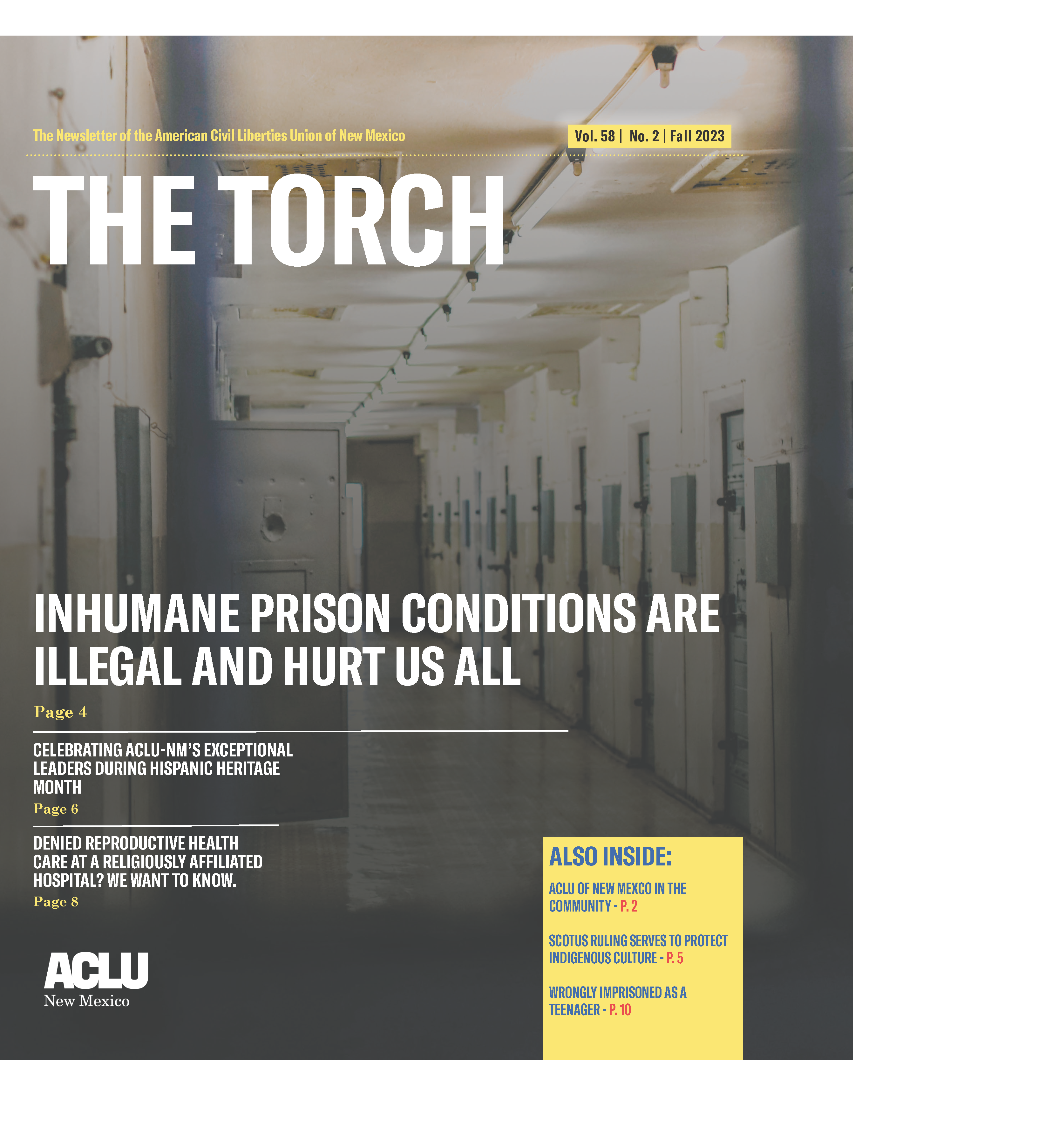As the vibrant autumnal hues grace the horizon, we at the ACLU of New Mexico stand proudly to observe National Hispanic Heritage Month—a time of reverence and jubilation for the cherished histories, cultures and contributions of our fellow Americans and notably New Mexicans with Latin ancestry. We take this moment not only to celebrate the exceptional leadership of our legal director, Maria Martinez Sanchez, director of public policy, Nayomi Valdez and communications director, Maria Archuleta, but also to reflect on the significance of this annual commemoration.
We take immense pride in recognizing the invaluable contributions of these visionary leaders, who have been the backbone of ACLU-NM's programmatic endeavors
This hallowed observance, spanning from September 15 to October 15, traces its roots back to 1968, starting as Hispanic Heritage Week. This tribute to Latin cultures and contributions blossomed into a 30-day celebration in 1988. On August 17, 1988, this observance was enshrined into law, solidifying its place in American society. Significantly, the selection of September 15 as the starting date marks the independence anniversaries of several Latin American countries, including Costa Rica, El Salvador, Guatemala, Honduras and Nicaragua. Mexico and Chile also celebrate their independence days on September 16 and September 18, respectively.
As we embrace the historical significance of Hispanic Heritage Month, we take immense pride in recognizing the invaluable contributions of these visionary leaders, who have been the backbone of the ACLU of New Mexico’s programmatic endeavors. The embers of change they have ignited have illuminated the way for transformative advancements in civil liberties, ensuring that the principles of justice, equity and inclusivity are not mere rhetoric but guiding lights in all that we do.
Getting to know our Legal Director, Maria Martinez Sanchez
Maria Martinez Sanchez stands as an exemplar of unyielding commitment and fierce advocacy. Born and raised in the heart of “Burque,” her roots trace back to the vibrant cultures of Mora and Farmington. Her upbringing, immersed in the legacy of her parents' involvement in the Chicano Civil Rights movement and her mother's steadfast passion for justice, provided her with the fire and conviction that blaze in her work today.
Maria's dedication and the collective vision of the ACLU-NM team stand as guiding lights towards a brighter future for all.
Maria infuses her work with the spirit of her familial lineage and heritage. A proud native New Mexican, she navigates her role as a Latina attorney with profound insight. Her rural Northern New Mexico roots offer a unique perspective that resonates with clients and the public alike, breaking down barriers that might otherwise hinder their access to justice.
Her identity was further enriched through her 25-year journey as a Mariachi musician, a transformative experience that not only kindled her linguistic fluency but also fueled her commitment to champion the rights of immigrants.
One of Maria's most notable professional achievements was her pivotal role in a legal team that eventually secured a groundbreaking ruling from the New Mexico Supreme Court. This ruling deemed the exclusion of agricultural workers from the protection of workers' compensation as unconstitutional, extending the same rights to workers in dangerous jobs – predominantly immigrants – that desk-bound professionals take for granted.
As a key leader at the ACLU, Maria's journey finds resonance in a diverse and committed leadership team. This constellation of passionate individuals reflects the organization's unwavering dedication to equity, justice and belonging.
In the face of challenges, Maria and her colleagues find solace in camaraderie, sometimes over a drink, to keep the flame of advocacy burning bright. At the heart of her journey, Maria's love for working at the ACLU shines through. The shared values and common commitment to equity and justice create an environment where every moment is infused with purpose and shared understanding. In a world often marred by uncertainty, Maria Martinez Sanchez's dedication and the collective vision of the ACLU-NM team stand as guiding lights towards a brighter future for all.
Getting to know our Director of Public Policy, Nayomi Valdez
From the sun-kissed lands of Las Cruces, Nayomi Valdez's journey embodies resilience, determination and the unwavering support of her family. Born to a young yet deeply committed mother, Nayomi's life was filled with love and joy despite the economic challenges. While the shadows of struggles, stereotypes and statistics lingered in the background, the bedrock of strong family values nurtured her path.
In her pursuit of justice, Nayomi acknowledges the transformative power of diversity.
Rooted in the legacy of her ancestors, Nayomi's heritage traces back over 400 years to a family settled in Loma Parda, now Garfield. Her great grandparents tilled the earth, and vivid childhood memories of harvesting chile, cotton and eggs on the family farm form her identity. Her connection to the land is more than nostalgia; it's a reverence for a legacy she aims to reclaim, as she dreams of buying a portion of her family's land and tending it with the same care her forebears did.
Nayomi's idol, her great grandmother Marianna Gonzales, epitomizes strength and values that resonate deeply within her culture. Marianna's indomitable spirit carried her through raising nine children during the Great Depression, business ownership and farm management. A woman of formidable humor and an undeniable presence, Marianna's legacy as a matriarch continues to shape Nayomi's values, encapsulating the essence of a heritage that will thrive for generations.
The seed of passion for justice was sown within Nayomi from a young age. Raised by her mother's resolute mantra, "don't let them make you a statistic," Nayomi recognized early on that societal systems aimed to pigeonhole her. Overcoming hurdles shaped her resilience. Nayomi embraced advocacy and activism as her path – a journey that began by advocating for her own child's rights within the public school system – blossomed into diverse roles: issue advocacy, electoral campaigns, and politics, reflecting her holistic approach to change.
In her pursuit of justice, Nayomi acknowledges the transformative power of diversity. An outlier at tables dominated by different voices, she recognizes the potency of her lived experience in deepening understanding. Her unwavering commitment to inclusivity underscores the belief that lasting change is only possible through diverse perspectives and approaches.
As Nayomi faces challenges, she turns to her colleagues for solace, understanding the unique struggles they all share. Within the walls of the ACLU of New Mexico, Nayomi finds fulfillment in her role as an advocate for justice. Her journey, from unpaid activist to a key leader in the ACLU, mirrors the organization's commitment to equity, inclusion and social justice. As the ACLU continues to champion change, her presence shines as a testament to the power of heritage, advocacy and unwavering commitment.
Getting to know our Communications Director, Maria Archuleta
Nestled within the captivating Española valley, Maria Archuleta's journey unfolds against the backdrop of New Mexico’s beautiful mountain ranges. With each sight of those peaks, there is a deep connection to her roots. Growing up, she felt the weight of preconceived racist attitudes toward her town. It gave her an early understanding of prejudice and fostered a defensive pride in her tight-knit community and in her identity. Her parents reinforced that pride, while also fostering an awareness of Northern New Mexico’s complicated history as a place that was colonized twice.
Through her communication strategies, she bridges the gap between abstract legal battles and the lived experiences of those impacted by them.
Reflecting on Hispanic Heritage Month, Maria's thoughts fill with an array of figures who broke barriers and overcame stereotypes. Among the luminaries are Cesar Chavez, Dolores Huerta, Bad Bunny, AOC, Linda Ronstadt, Cheech Marin and Sonia Sotomayor. As she draws inspiration from these renowned titans, she also holds a special corner in her heart for Selena Gomez.
It is important to note that while these icons serve as inspiration, her real heroes are family and community members. She believes they are what make a strong and vibrant community and empower individuals. Maria is especially proud of Latin youth and has a passion for encouraging them to pursue what they love – be it science, poetry or skateboarding.
Her fervor for civil rights stems from an early understanding of her middle-class privilege. It was clear to her that she had more opportunities compared to many of her peers. When she went to college in California, her drive was galvanized by the fight against the anti-immigrant and anti-affirmative action movements happening there in the 90s. She quickly moved from writing about these issues for a bilingual newspaper to working on them directly at the ACLU of Northern California, where she learned how to use her voice “to rage against the machine” that suppressed the communities she was engaged with.
Maria’s connection to her roots and her firsthand experiences of bias and misperceptions have sculpted her commitment to giving voice to the people who are directly impacted and putting human faces to the cases and policy initiatives that define the ACLU-NM's mission. Through her communication strategies, she bridges the gap between abstract legal battles and the lived experiences of those impacted by them.
Unity: Collaborative Advocacy at ACLU-NM
The collaboration led by the trio of Maria Martinez Sanchez, Nayomi Valdez and Maria Archuleta is what makes ACLU of New Mexico effective. Their individual brilliance and expertise converge into a force that propels the organization to the forefront of justice advocacy.
Maria Martinez's compassion for people, legal acumen and tireless work ethic sets the tone for all of ACLU-NM's legal advocacy. Nayomi's remarkable skill in distilling intricate issues to their core, her adeptness at forging connections and her unyielding disregard for the constraints of patriarchy and sexism render her a fearless policy advocate. And finally, Maria Archuleta ties the advocacy together using her talent for effective storytelling to amplify the voices that often remain unheard. Her capacity to empower clients, coupled with her understanding and empathy for New Mexico’s communities, manifests a powerful advocacy that resonates deeply.
Their collective endeavors and solidarity fuel our mission. Maria Archuleta's enthusiasm and pop culture references, Maria Martinez Sanchez's candid humor laced with expletives and Nayomi’s infectious laugh and playful jabs at her colleagues bolster an environment where staff can be themselves. Their collaborative spirit extends far beyond their individual roles, enriching each other's efforts and inspiring a shared pursuit of justice. As Hispanic Heritage Month unfolds, we celebrate not only our nation's diverse heritage, but also the resolute leadership of Maria Martinez Sanchez, Nayomi Valdez and Maria Archuleta, whose collective efforts embody the spirit of unity, advocacy and progress that define the ACLU-NM's mission.




